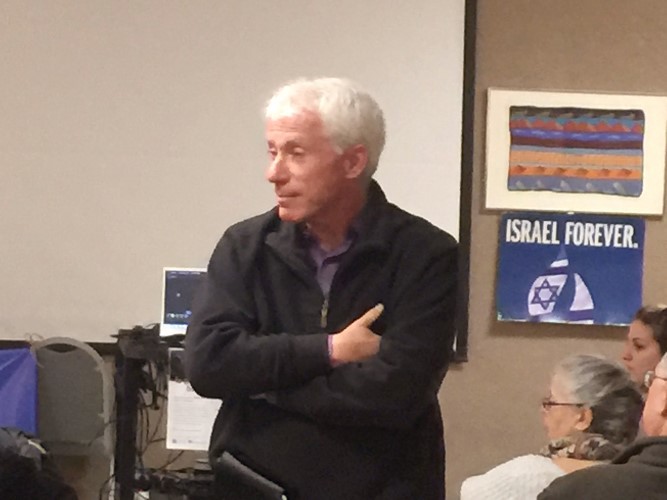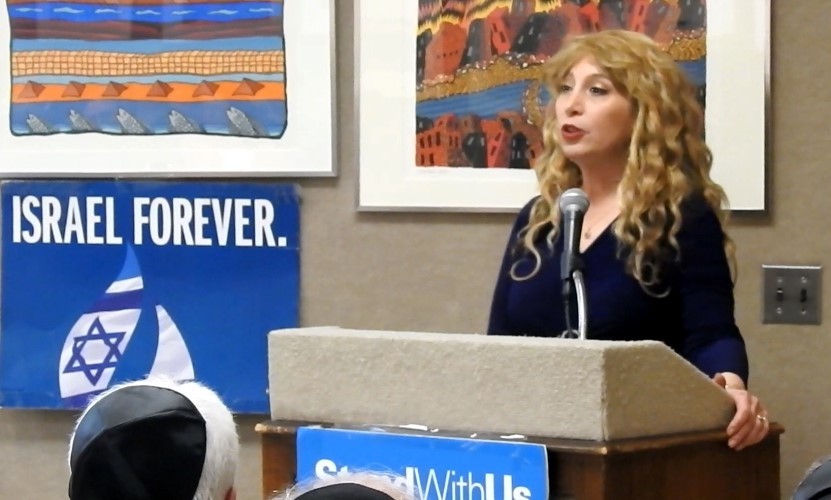Discussion, studies, images, stories suggest media bias against Israel
PROVIDENCE – Gary Kenzer, executive director of the North American office of media watchdog Honest Reporting, discussed mass media’s depictions of – and bias against - Israel during a talk on March 30 at Temple Emanu-El.
According to its website, Honest Reporting “monitors the news for bias, inaccuracy, or other breach of journalistic standards in coverage of the Arab-Israeli conflict. It also facilitates accurate reporting for foreign journalists covering the region.”
The presentation-discussion held at the East Side temple supported this statement with a series of studies, images and stories that provided compelling evidence that the Israeli-Arab conflict is in fact portrayed inaccurately in the media. Kenzer, after affirming that Honest Reporting by no means views Israel as perfect, put the organizational mission into more colloquial terms at the beginning of the evening:
“The concept of our organization is simple,” he began. “We believe that Israel should be treated the same way as any other country in the world, which is innocent until proven guilty.”
The event was presented by StandWithUs Rhode Island and jointly sponsored by Temple Emanu-El and the Jewish Alliance. The first in a series of communitywide events on numerous aspects of the Middle East conflict, it was attended by almost 100 people.
Kenzer invited the audience to contribute during the presentation, and asked them questions throughout the evening. His first point was even in the form of a question: “How do you get a point across that everyone will remember?” Responses were plentiful and included photos, humor, headlines, and emotions – especially those elicited by stories or images having to do with children – and memorable punchlines. The answer Kenzer seemed to be looking for, however, was “the concept of repeat.” That is, being exposed to the same tone and theme of subject matter repetitively.
Examples of anti-Israel media reports punctuated the evening, including one from a Chicago news channel that wished Jewish viewers a Happy Yom Kippur with an image of a yellow star bearing the word “Jude,” which European Jews were required to wear during World War II. Kenzer, after showing these images, asked the audience to consider the motivation behind such mistakes … or so-called mistakes.
“Sloppy work? Intentional? You have to decide for yourself,” he said.
Audience members reacted to such examples with noises of disgust. Many, it seemed, were not convinced that such reckless and offensive errors are accidental.
Another topic of the evening was the power of Photoshop. Kenzer showed the audience an image of a boy throwing a rock, which looked like a candid photo. In popular media, Kenzer said, this image has circulated widely. He then showed the uncropped version of the photo, which revealed some 20 photographers snapping images of the boy as he threw, suggesting the photo might not have been so candid after all.
The current image-driven bias in media reporting, he said, is partially because many newspapers have laid off their photographers, and now reporters are expected to take photos despite perhaps having little or no training in news photography. He said such untrained photographers can create bias in their images, which can lead to severe distortions.
“When we sat back and did nothing, it didn’t go real well for us,” he said.
The evening ended with a study that Honest Reporting had conducted wherein it created two Facebook pages: one advocating for Israel, one advocating for Palestine. The exact same language was used on both pages, with only the subject line of the posts changing – for example, posting “Long live Israel!” on the Israeli page, and “Long live Palestine!” on the Palestinian page.
After several posts were made, the Israel page was taken down by Facebook moderators because of alleged violations of community standards. The Palestinian page remains active to this day. According to Kenzer, no explanation was ever given.
Kenzer reminded the audience that a balanced and fair view of both sides of the story is always necessary to get an informed understanding of a given situation – and urged readers to be skeptical of information that is presented as fact.
ARIEL BROTHMAN is a freelance writer who lives in Wrentham, Massachusetts.











